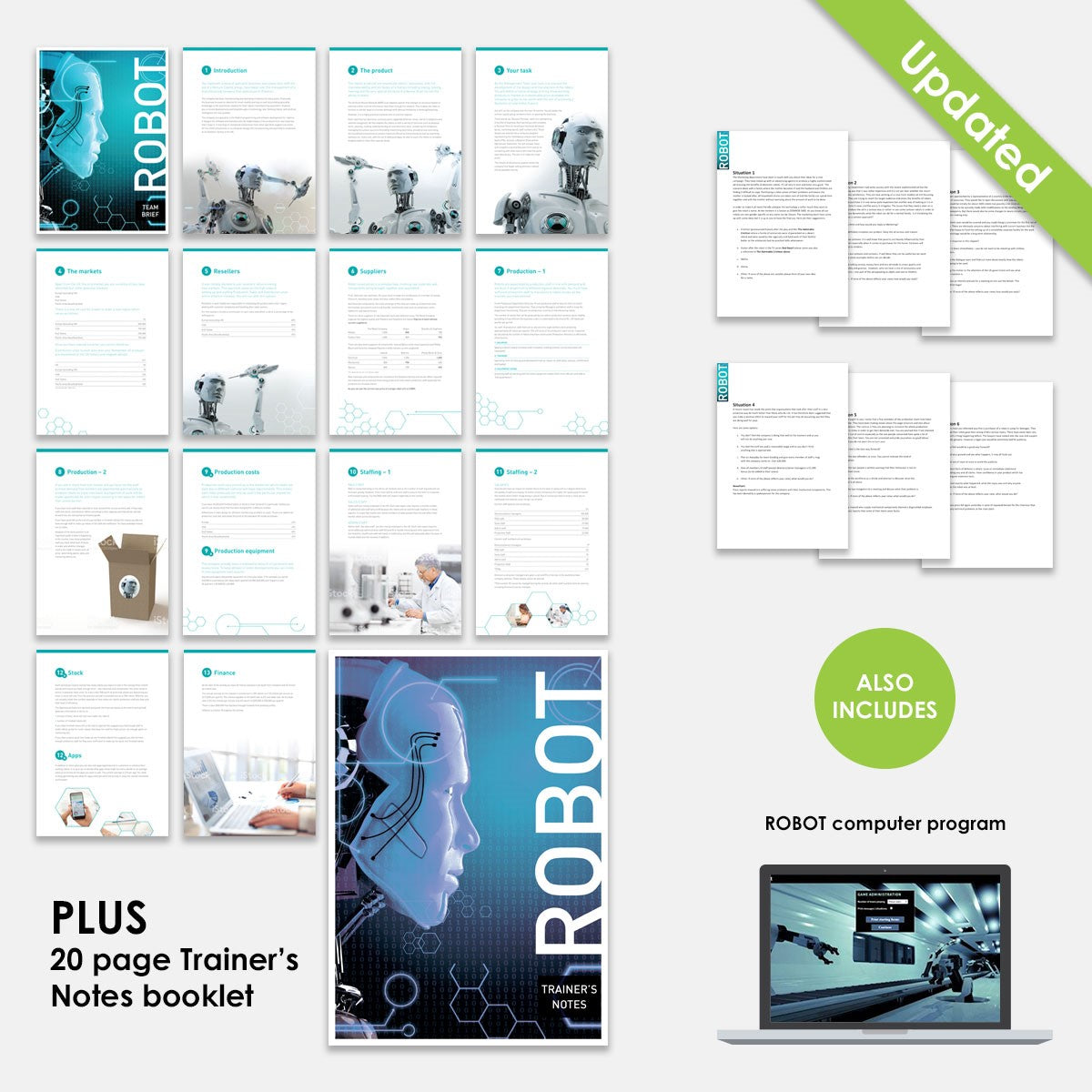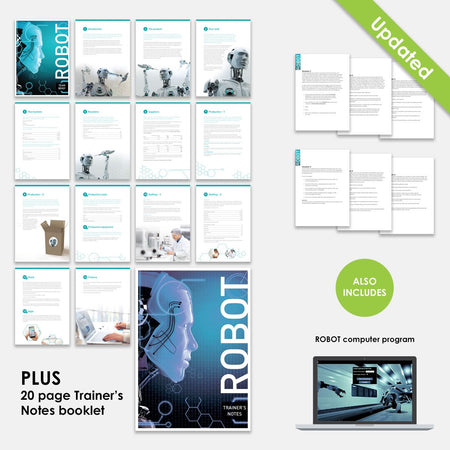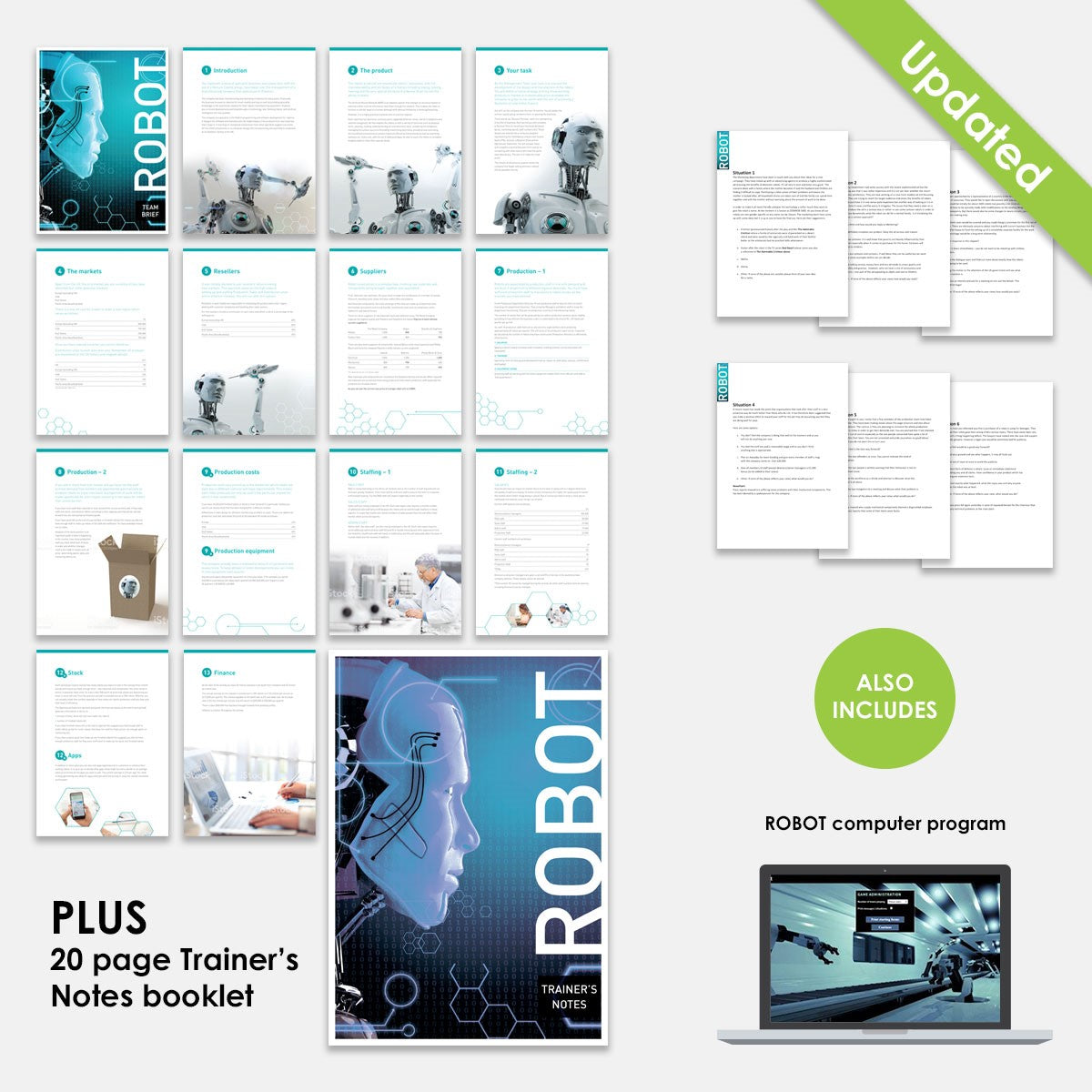Home
»
Robot™ | Business Simulation
Set in the manufacturing sector this business simulation is about growth - by investing in new markets across the globe. Get the business model right and the world is your oyster, but the competition in the field of robotics is tough!
to understand basic business acumen skills
to experience stock control, ordering and forecasting
to analyse P&L, Balance Sheets and Operational Statements
to make decisions in a financial context
Regular price
£995
ex. VAT
Couldn't load pickup availability
Product details
- Type Business Simulation
- Timing 4-6 hours + debrief
- Use F2F & Virtual
- Target Audience All Levels
- Min Participants 6
- Max Participants* 24
- *More delegates? Contact Us
- Computer Required Yes (1)
- Printer Required Optional
- Supply Format Hard & Digital Copy
Product downloads
- Factsheet Download
Northgate says...
"Learning-by-doing is more effective than traditional forms of learning. It's a safe environment in which to try things out. And our gaming elements make the learning all the more fun, engaging and memorable."
- Understand basic business acumen skills
- Experience stock control, ordering and forecasting
- Analyse P&L, Balance Sheets and Operational Statements
- Make decisions in a financial context
- Practise being part of a business management team.
Ideally suited to:
Courses on business management, strategic planning and basic business finance. Also chosen by Trainers for inclusion in courses on Leadership and operating as an effective team.
Teams take over the management of a robotics company. There are potential, new markets in Europe, USA, Gulf States and Asia Pacific. At each quarter of the simulation teams have the option to enter new regions, so what will they do? It’s important to establish a sound business model at home but timing is critical in this highly competitive industry sector. How much risk are teams prepared to take in order to gain an early foothold in vital new markets?
Margins are tight so staffing and stock levels are key issues. The company needs to meet customer demand - but not at any cost!
Success is about good forecasting, choosing the right suppliers and having the right sized production workforce. If there are insufficient finished robots the company will be unable to meet demand - how badly will that reflect on their market share?
At the start teams need to analyse business data and make informed decisions. Sometimes they need to make educated guesses - just like real business - but it’s important not to make assumptions when there is data and history available to make informed choices.
There are also optional business situations to discuss (they are thought provoking and good for discussion at the end but don’t actually influence the results). Other issues do have an effect. For example, cultural differences mean that the raw materials vary according to the region for which robots are being built. So robots are ‘region specific’. Teams also have the opportunity to extend the business by supplying apps for customers to enhance their existing robots.
The winning team is the one with the most profit at the end - or you can use other criteria.
- Give a brief introduction, in terms of how the simulation works: a number of rounds in which teams make business decisions that are analysed by the program. Explain what determines the winning team.
- Issue each team with a Team Folder and allow 60-90 minutes for teams to analyse the contents.
- Issue each team with a Decision Form on which teams record their decisions for the first quarter: prices, staff numbers, markets, salaries, advertising spend etc.
- Collect the Forms and enter the details into the program. When all teams data is entered, issue P&Ls, Balance Sheets and Operational Statements for each team. Teams analyse their results. In the next decision period they can amend any of their first decisions as they strive to get control of the business and maximise profit.
- There is the option each round to issue a ‘Situation’ to teams. These are business issues to consider. They do not influence the result but are useful for discussion at the debrief.
- This process repeats for a number of rounds - six usually but you can go up to 12.
- At the end, ask each team to review their performance and to give a presentation in terms of their teamwork, decision making and business management.
- Lead a debrief on the financial aspects of the activity and compare the final profits of all teams. Announce the winning team.
- Summarise the key points and lesson learned and relate to the workplace.
Full guidance supplied in the Trainer’s Notes.
Hard & Digital Copy
- ☑️ Hard copy pack supplied
- ☑️ Program supplied (internet access required)
- ☑️ PDFs & PowerPoint supplied
Digital Copy
- ☑️ Program supplied (internet access required)
- ☑️ PDFs & PowerPoint supplied
Contents
- Trainer’s Notes
- Trainer's PowerPoint
- Computer Program (internet access required)
- Team Folders (with 13 inserts)
- Handouts: Sets of Six Business Situations (PDF files)
- Also included for virtual classroom use: Trainer's Checklist, Period 1 Decision Form, Starting Financial Data (PDF files)
This activity is for face-to-face and virtual classroom use. The digital files are supplied via the Northgate Trainerhub.
Our licence offering is designed to provide exceptional value and flexibility for your organisational training needs.
Upon purchase, each Northgate activity includes a five-year licence for repeat use, with up to a maximum number of delegates per training session. The maximum number of delegates for this activity is 24 per licence. This grants you the freedom to use the activity repeatedly, with the specified maximum number of delegates, for five years.
All Learning and Development (L&D) professionals based at the same site (or
‘remote hub’) as you are granted access to these resources, including to the digital files on the Trainerhub via your site-specific Trainer Dashboard, fostering a collaborative spirit within your immediate team.
Should you wish to make this activity available to a wider audience within your organisation, additional licences are required. We understand the varying needs of different organisations and aim to provide flexible options to suit your requirements.
For further information on our licence terms, please contact us. We are here to assist you in enhancing your training initiatives and ensuring a seamless and hassle-free licensing experience.
To use with more than 24 or for multiple site licences please contact us for a quote.
M
Mohannad Al Assal, Managing Partner, Better Consulting, Egypt We used 'Robot' on a strategic management and leadership course with 24 participants. The exercise brought out very clearly the need for a managing body or Board to set objectives and control the work of an organization. The greatest learning points were that any team needs to spend time planning, selecting which strategy to apply and building a structured approach to a task, ensuring that everyone is totally clear on what has to be achieved.
T
Ted Hall, Director, TBT Associates 'Robot' Business Simulation went extremely well. It's very good. Keep doing what you do, Northgate!
L
Laura Manze-Coakley, Competence Development Specialist, Volvo Group We have just finished a two day management program where we play the 'Robot' game. We really like running this game, it gets the delegates to think of actions they take in a business environment, it creates good conversations within their groups and a bit of competition within the whole group which is healthy. It drives them to drill down and look at the whole picture of a business, which is critical. We will continue to use this game with our training.
-

Anti-boredom Guarantee
If you are not delighted with your purchase or 100% happy, we offer a no-quibble returns service on unused goods.
-

Fast Global Delivery
We offer next day courier delivery in the UK, 2-6 days elsewhere and same day delivery on our digital products.
-

Easy Ordering
To order you can add this activity to your basket and proceed through secure online checkout, or request an invoice.
-

Trainerhub Access
Benefits include easy access to your own resource library, instant upgrades, Trainer Forum, training tips and free activities.
Northgate Trainerhub
Get everything at your fingertips with our FREE online resource library. Get instant access to games, upgrades, peer-support and even free activities. Simply sign up or purchase any game.


M
Mohannad Al Assal, Managing Partner, Better Consulting, Egypt We used 'Robot' on a strategic management and leadership course with 24 participants. The exercise brought out very clearly the need for a managing body or Board to set objectives and control the work of an organization. The greatest learning points were that any team needs to spend time planning, selecting which strategy to apply and building a structured approach to a task, ensuring that everyone is totally clear on what has to be achieved.
T
Ted Hall, Director, TBT Associates 'Robot' Business Simulation went extremely well. It's very good. Keep doing what you do, Northgate!
L
Laura Manze-Coakley, Competence Development Specialist, Volvo Group We have just finished a two day management program where we play the 'Robot' game. We really like running this game, it gets the delegates to think of actions they take in a business environment, it creates good conversations within their groups and a bit of competition within the whole group which is healthy. It drives them to drill down and look at the whole picture of a business, which is critical. We will continue to use this game with our training.










